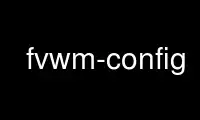
This is the command fvwm-config that can be run in the OnWorks free hosting provider using one of our multiple free online workstations such as Ubuntu Online, Fedora Online, Windows online emulator or MAC OS online emulator
PROGRAM:
NAME
fvwm-config - query an existing fvwm installation
SYNOPSIS
fvwm-config [--help] [--version] [--info] [--prefix] [--exec-prefix] [--bindir]
[--datadir] [--libexecdir] [--sysconfdir] [--mandir] [--localedir] [--fvwm-moduledir]
[--fvwm-datadir] [--fvwm-perllibdir] [--default-imagepath] [--default-userdir] [--fvwm-
exe] [--supports] [--supports-<feature>]
DESCRIPTION
fvwm-config is a shell script that provides an information about the fvwm version,
installation directories, built-in paths and supported features.
OPTIONS
fvwm-config prints to the standard output in all options. Both short and long GNU-like
option names may be used.
-h --help -?
prints the short usage
-v --version -V
prints the version
-i --info
prints the full info page
-P --prefix
prints the installation prefix
-E --exec-prefix
prints the installation exec-prefix
-B --bindir
prints the installation bindir
-D --datadir
prints the installation datadir
-L --libexecdir
prints the installation libexecdir
-S --sysconfdir
prints the installation sysconfdir
-M --mandir
prints the installation mandir
-O --localedir
prints the installation localedir
-m --fvwm-moduledir
prints FVWM_MODULEDIR, where the modules are installed
-d --fvwm-datadir
prints FVWM_DATADIR, where the system wide configs are installed
-p --fvwm-perllibdir
prints FVWM_PERLLIBDIR, where the perl library is installed
-I --default-imagepath
prints the built-in ImagePath
-U --default-userdir
prints the default FVWM_USERDIR, note: $HOME is not expanded
-e --fvwm-exe
prints the fvwm executable name (in bindir)
-s --supports
lists all supported features, one per line
--supports-<feature>
prints nothing, returns: 0 if the <feature> is supported, 100 if not, 200 if
unknown. All or supported feature names may be found using --info or --supports
respectively.
USAGE Here are some real life usages.
Checks for xft support:
if fvwm-config --supports-xft;
then echo 1; else echo 0; fi
fvwm-themes package checks for the correct fvwm version installed using:
fvwm-config --version
and tries to use the same installation directories:
fvwm-config --bindir --mandir --fvwm-datadir
A way to find the full path to the fvwm executable:
echo `fvwm-config --bindir`/`fvwm-config --fvwm-exe`
A way to start modules in perl:
use lib `fvwm-config -p | tr -d '0`;
use FVWM::Module;
For a more human readable output, try:
fvwm-config --info
COPYING
fvwm-config is a part of fvwm package and distributed by the same terms, see GNU GPL.
Use fvwm-config online using onworks.net services
